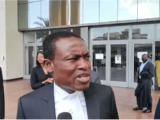
Seal gaps in the public purse: Emmanuel Wilson Jnr charges the government.
Mr. Emmanuel Wilson Jnr, Chief Crusader of the Crusaders Against Corruption Ghana, has urged the government to make concerted efforts to close gaps in the government’s finances rather than implementing the Electronic Transfer Levy (E-Levy).
He stated that Ghana needed to carefully and urgently reduce wasteful expenditure.
“Permit me to strongly add that the main reason why debates are being raised as to why Ghana should not go to the International Monetary Fund (IMF) is just because the IMF would streamline our unnecessary expenditure and that is what Ghana is uncomfortable with. This is what is referred to as the IMF conditionalities. It is not anything ambiguous and so anyone who really wishes Ghana well as in our current state of economic struggle, should not shy away from any institution that would want us to cut down on unnecessary expenses,” he said.
Mr. Wilson Jnr made this statement while speaking at the Ghana Pentecostal and Charismatic Councils (GPCC) 53rd Annual Conference, which was held at the Pentecost Convention Centre in Gomoa Fetteh, Central Region.
Streamline
He stated that the administration suggested the E-levy for a variety of reasons, including the need to broaden the tax base and the country’s economic crisis.
He did, however, clarify that in order to resolve these concerns, the government would need to reduce spending and safeguard the public purse.
“It has been proven that when we as a nation are able to cut down these unnecessary expenditures, even by 30 per cent, Ghana shall save about GH¢8 billion each year,” he said.
That sum, he claimed, was more than what was anticipated from the E-levy.
Mr. Wilson Jnr stated that since last year, when the 2022 budget was presented to Parliament, the issue of the E-levy has been a topic of conversation, making it critical to educate the clergy on the levy so that they may further educate their members.
“Charges are demands or an amount as a price for a service rendered or goods supplied. So when the telcos and banks charge you and me for any electronic transaction, they do so because they have or are rendering services. This is totally different from what the E-levy seeks to do,” he explained.
Unfair
He went on to say that the planned tax was unfair and defied the features of a tax, using an example of two people paying for the same quantity of fuel, one in cash and the other electronically.
Both, he added, would receive the same amount of fuel; however, the one paying electronically would incur an additional fee of 1.75 percent of the amount paid while receiving the same amount of fuel as the one paying in cash.


